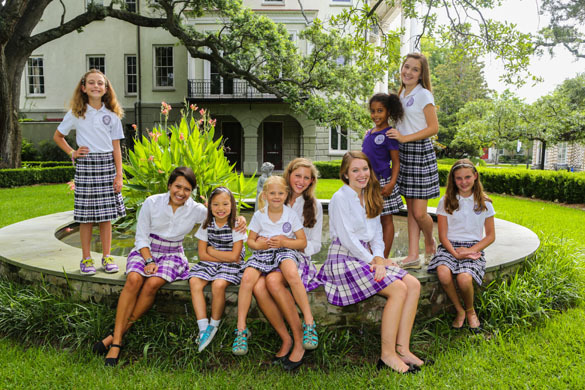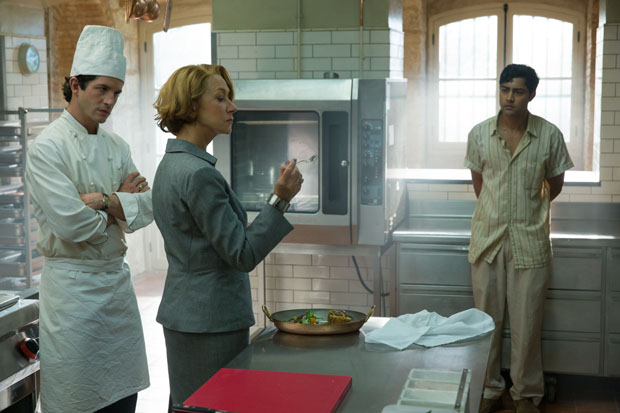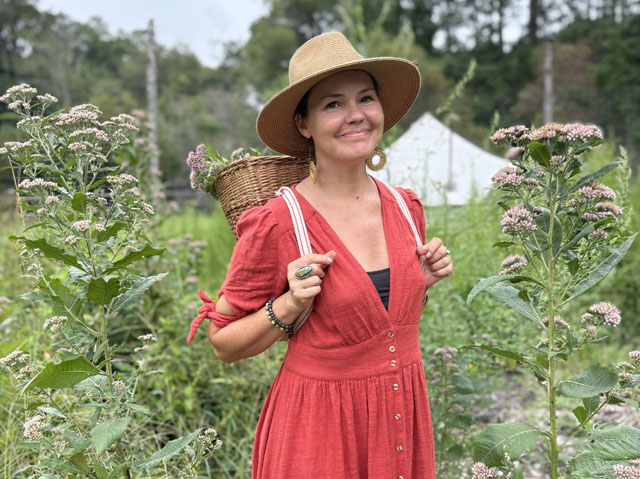In Praise of Education
29 Sep 2013
A candid sit-down with Jill Muti of Ashley Hall about her passion for community and teaching
By DENISE K. JAMES

People sometimes claim that the arts—music, literature, sculpture and other elements that make one's life more beautiful―matter little when it comes to obtaining a practical career. But these naysayers would have a bit of trouble getting this argument to hold water after a conversation with Jill Swisher Muti, Head of School at Ashley Hall. A lifelong musician with a rich history of  performance, as well as a proponent for independent school education, Muti delivers fiery passion and professionalism each day to the students, and the staff, that make Ashley Hall one of Charleston's most successful private institutions.
performance, as well as a proponent for independent school education, Muti delivers fiery passion and professionalism each day to the students, and the staff, that make Ashley Hall one of Charleston's most successful private institutions.
Muti is often asked how she came to form a career in education administration after obtaining her master's degree in music at Duke University, and a bachelor's degree in English and music at DePauw University. Her simple answer is that she discovered, as many do, her life's path after graduation.
"You eventually recognize what your life’s work should be," she says.
Her career in independent school administration began when she accepted the position of Director of Fine Arts at Ravenscroft in Raleigh, NC. During the 12 years in this position, she discovered her passion for leading independent schools in their mission driven work. She was persuaded to take on the role of Assistant Head of School for Ravenscroft as well. In 2004 Ashley Hall came calling.
As a musician at heart, Muti continues to use her passion for music, art and performing to inspire her daily work and serve as a touchstone for her educational philosophy and food for her soul.
Luckily for the students and staff of Ashley Hall, Muti has been a strong presence for the last nine years. As Head of School, she believes whole-heartedly in the mission of Ashley Hall, as well as the abilities of the girls who attend. The history of the school dates back to 1909, and Muti describes its founding mission as "still extremely relevant today and the bedrock of everything we do at Ashley Hall."
"Our founder, Mary Vardrine McBee, a maverick in her own time, was determined to create a school in the South for women that was equal to or better than schools in the North. Her founding mission was to produce educated women who were independent, ethically responsible, and prepared to face the challenges of society with confidence. It is what we still strive to do today." she explains.
Muti notes that the call of women, and of human beings, is different in the 21st century, referring to our "global society," and how it makes her job different in terms of preparing the young women who matriculate at Ashley Hall. Still, the notions of independence, ethical behavior, and confidence in your moral compass has not changed―they just "look at it differently," she says.
One example of preparing for this more global society is fluently reading and speaking a foreign language, which is part of an Ashley Hall education. Even as young as two years old―the youngest you can attend the school―the girls are required to attend French classes. In addition, Latin and Greek are mandatory for 7th and 8th grade students. Muti believes in the importance of being multi-lingual to truly understand others’ points of reference and to communicate in our world.
"If you cannot communicate with someone in a way that makes sense to them, it is more difficult to understand their point of view, the thoughts that are driving their behaviors. Without this communication it is impossible to develop empathy toward someone who is unlike you, and that sense of empathy is more important now in our global society, than it has ever been." she says.
Muti believes that the humanities are the cornerstone of secondary education and enrich the lives of her students. "I understand there seems to be a cultural pushback against the humanities. But understanding what it means to be human, to be able to connect and communicate in a meaningful way with others, is at the heart of everything. The more sophisticated you are at communication, the deeper your understanding and respect of others social mores, the more empathy you develop and the more apt you are to have a fulfilled life."
At Ashley Hall, students develop an understanding of their world through courses like International Law and Human Rights or Reading the Pacific Rim, and learn to express themselves using all forms of communication, from language to poetry to music to classical theater. Muti herself teaches instrumental music classes and enjoys the opportunity to share her love for musical expression with students.
The students of Ashley Hall have chances to communicate with one another in different ways during the typical school day, which begins with a student-led morning assembly. Classes run in 80-minute blocks, and alternate every other day. She says that the schedule has been in place for five years. It allows for more intense focus on subject matter and the additional class time for complex scientific experimentation, and most importantly, the girls enjoy it. Lunch is served family style and is viewed as a time to socialize and enjoy food; nothing else happens during the meal. “Ashley Hall follows our food philosophy which is based on the notion that this shared experience of breaking bread together strengthens our community ties. Our food philosophy is closely influenced by the ‘slow food movement’ and requires our dining staff to prepare meals for the students that use local, fresh produce,” says Muti. Also, during each school day, the girls gather together for arts and athletics.
When I ask Muti about the hot topic of bullying in schools she shares that, “Bullying is absolutely not tolerated at Ashley Hall because it threatens the community in which we work and play, and although the school is a microcosm of our larger society in which bullying is often seen or tolerated, the instances at Ashley Hall are rare. Because we are a single gender school, and our class sizes are small, the girls develop very supportive relationships with each other. They celebrate each other’s success and develop friendships that they will have throughout their lives. I think a beautiful thing about Ashley Hall is how we're able to impress the concept of a community on the girls. I don’t want to give the impression that our girls are perfect and that we don’t face the different stages of development in our students, but if the girls are having a challenge, we clue in and handle it in the way that best serves the child."
A typical day for Muti begins early, around 5 a.m., when she has time to work alone and prepare for the day. As far as whether she can be found inside her office or walking about Ashley Hall's lush campus, her answer is that it "depends on the day."
"I am in meetings a lot," she admits with a smile. “But at the end of a school year, when I look out over our beautiful campus, and see the seniors in their white dresses holding their red roses, it is all so incredibly worthwhile. Our graduates are amazing young women who know themselves and are ready to take on their worlds with confidence. And that is recognized by top universities and colleges around the world as demonstrated by the Class of 2013 being awarded 3.4 million in merit scholarships," she says.
Education has been a hot topic in the United States for a while, and Muti shares her opinions with me about the state of education, both for boys and girls. While she declares herself to be "a zealot” for the benefits of single-gender education since arriving at Ashley Hall, Muti is well aware that all education, both public and private, is ripe for change. But, she is also careful to point out that schools cannot, and should not, take on problems that should be dealt with elsewhere―even though today's classrooms are more populated than ever.
"We've lost the idea of small schools where teachers foster meaningful relationships with students," she says. "When schools house 2,000 or more children, it changes what school should be. I believe as a nation we've dumped many societal problems on the school systems, and this is proving extremely challenging for educators."
Still, the need for strong educational programs is prescient. Muti feels that over the next 20 years secondary education is going to become more crucial than ever to a person's success as an adult.
"The buck stops with secondary education," she muses. "Things we'd want every citizen to know, how to look at the world―they need to be developed before a person's 18th birthday."
"At Ashley Hall it is all about the girls.” she says. "When they graduate they are independent, confident, ethical young women who understand themselves and take responsibility for their own futures. I'm proud of the girls―for what they are doing, becoming, and how they bring meaning to their lives."











